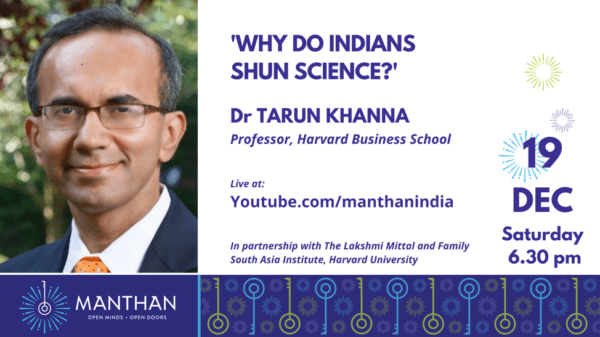8:00 AM ET // 6:30 PM IST
Join via YouTube: https://youtu.be/imxGZh0NkCk
Add to Google Calendar: http://shorturl.at/dxyCR
It might be odd to aver that Indians shun science — in a country that is lauded as a fount of software engineering, has just touched the heavens with Mangalyaan, and will likely make most of the vaccines for the world. But, the fact remains that India dramatically underinvests in science, to its detriment. Perhaps worse, we seem to eschew a scientific mindset to promote instead a variety of other modes of reasoning: parochial concerns, religious sentiment, and tradition.
While these have their place, in this talk Tarun Khanna, Jorge Paulo Lemann Professor at the Harvard Business School and Director of the Mittal Institute, will illustrate the costs of our apparent science-phobia by briefly discussing benefits of higher scientific literacy which we could tap into in three disparate Indian settings: the moribund market for jobs among youth, a polluted environment, and crumbling art and architectural heritage. To be clear, this is not a diatribe against the humanities and the social sciences, but rather it is an attempt to direct attention to a costly societal myopia.
——————
Tarun Khanna is the Jorge Paulo Lemann Professor at the Harvard Business School and Director of Harvard University’s Lakshmi Mittal & Family South Asia Institute. For over 25 years, he has studied entrepreneurship as a means of economic development. He currently teaches courses related to creativity in emerging economies. An online version, Entrepreneurship in Emerging Economies, one of Harvard’s most popular, has been taken by ~600,000 students in over 200 countries. A recent book, Trust, and an earlier one, Billions of Entrepreneurs, chronicle creative ventures in China, India and beyond.
In 2007, he was nominated to be a Young Global Leader (under 40) by the World Economic Forum. In 2009, he was elected a Fellow of the Academy of International Business. In 2016, he was recognized by the Academy of Management as Eminent Scholar for Lifetime Achievement in the field of International Management. The Government of India appointed him to lead several national committees connected to entrepreneurship and higher education. In 2020, he was asked by The Lancet, the world’s leading medical journal, to co-chair a commission to re-imagine the future of India’s health system.
Outside Harvard, he serves on the boards of the Washington-based global power company, AES Corporation, the global adtech company and India’s first unicorn, InMobi, Boston’s Museum of Fine Arts, PRS India, a non-profit dedicated to India’s parliamentary governance, is a cofounder of Axilor, a Bangalore-based incubator, and of several ventures across the developing world.

